Key takeaways:
- Child safeguarding involves a community effort that encompasses physical, emotional, and psychological safety for children.
- Community workshops enable collective learning, foster connections, and empower participants to address child safety issues effectively.
- Building trust through sharing personal experiences in workshops creates deeper connections and encourages collaboration for a safer environment.
- Effective workshop design should assess community needs, create an inviting atmosphere, and incorporate diverse learning methods to enhance engagement.
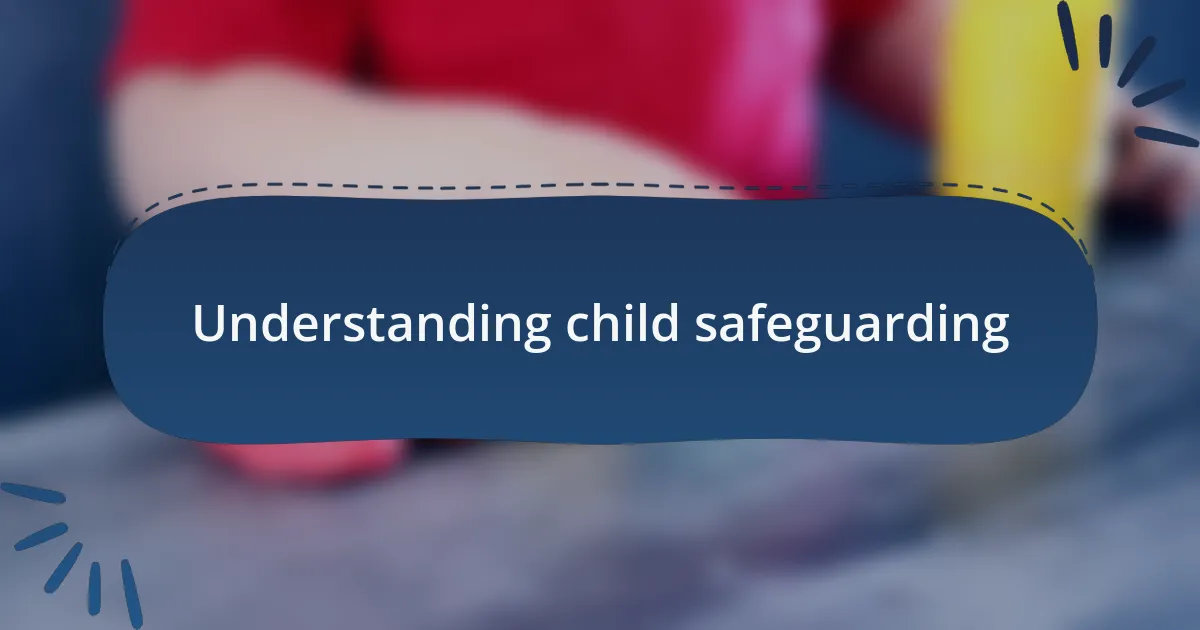
Understanding child safeguarding
Understanding child safeguarding involves grasping the various practices and policies designed to protect children from harm. I often reflect on the conversations I’ve had in workshops where parents expressed their concerns about the safety of their children in both physical and digital environments. This highlights just how vital it is to equip ourselves with knowledge and tools to ensure their wellbeing.
As I facilitated discussions on the importance of awareness in child safeguarding, I noticed how often misconceptions arise. Many people believe that safeguarding is only about preventing physical harm, but it also encompasses emotional and psychological safety. Have you ever thought about how neglect can affect a child’s development just as much as abuse? Hearing those stories from participants brought home the reality that safeguarding is multi-faceted and requires a broad understanding.
It’s crucial to remember that safeguarding is not solely the responsibility of parents or guardians, but a collective community effort. I often encourage workshop attendees to consider, “How can we work together to create a safer environment for our children?” This question firmly plants the idea that community involvement can significantly bolster our safeguarding efforts, merging individual responsibility with a united front for child welfare.
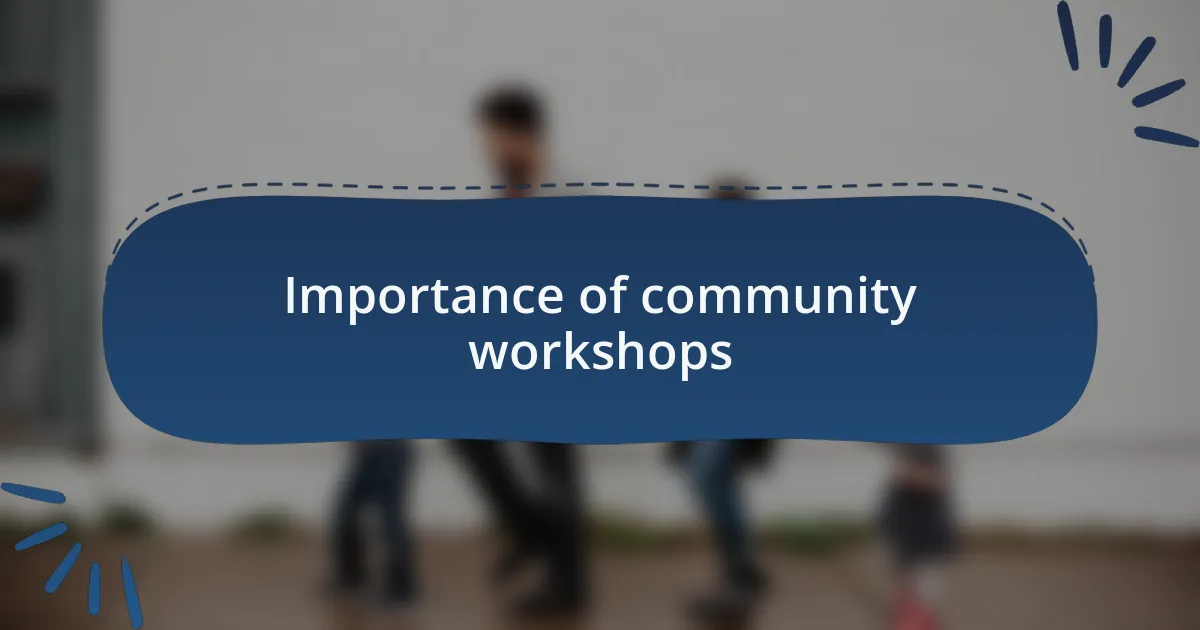
Importance of community workshops
Community workshops serve as vital platforms for collective learning and shared experiences around child safeguarding. I recall a particularly impactful workshop where a mother shared her experience of navigating the challenges of online safety with her children. It opened my eyes to how shared stories not only educate but also create a supportive environment where participants can feel validated in their fears and concerns.
In my experience, these workshops cultivate a sense of belonging and empowerment among participants. One woman, after attending a session on emotional safeguarding, expressed that she finally felt equipped to address her child’s mental health needs. Isn’t it amazing how a few hours of discussion can inspire individuals to take concrete steps toward better protecting their children? This transformation underscores how community involvement enhances our collective understanding of safeguarding practices.
Moreover, community workshops foster connections that extend beyond the sessions themselves. I once witnessed a group of parents band together to establish a neighborhood watch, inspired by a workshop discussion on physical safety. This initiative highlighted just how workshops can spark action, pushing individuals to collaborate and take ownership in creating a safer environment for their children. How can we overlook the power of community when it comes to safeguarding our youth?
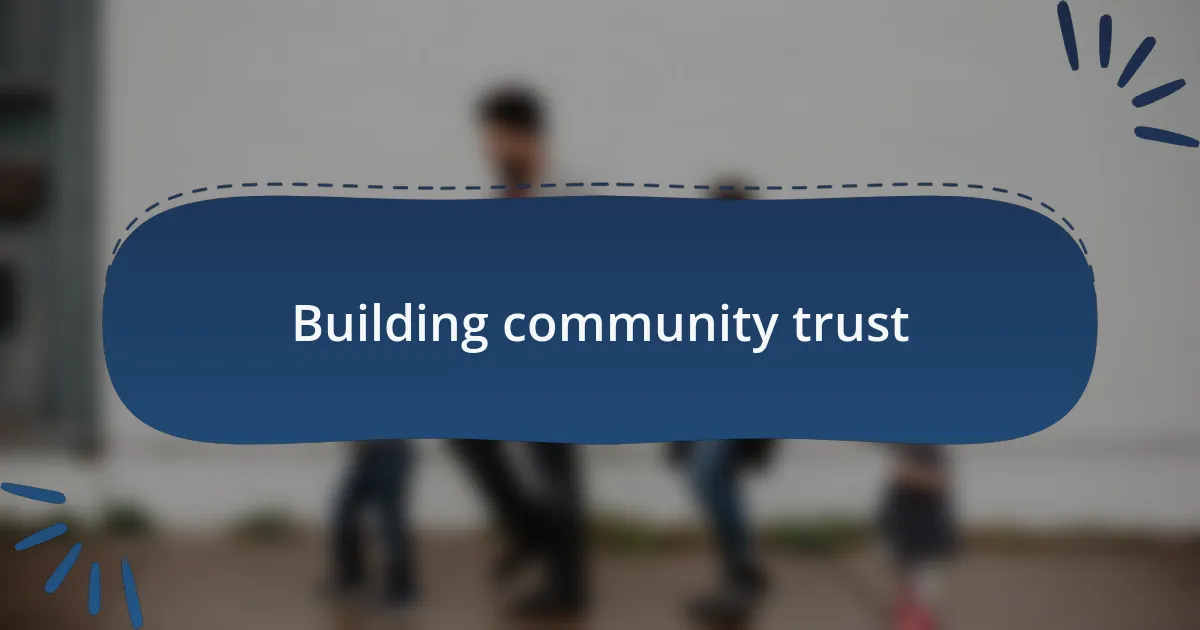
Building community trust
Building trust within a community is a gradual but rewarding process. I remember attending a workshop where trust-building activities were at the forefront, and one exercise involved sharing personal stories in small groups. Hearing different perspectives fostered empathy among participants and showed us that we are not alone in our challenges. Isn’t it remarkable how vulnerability can lay the groundwork for deeper connections?
As conversations deepened, people began to share not just their fears, but also their hopes for a safer community for the children. I found myself moved by a father who spoke about his desire to create a space where kids can play freely. His passion was contagious, reminding me that when we unite over common goals, we nurture trust. How often do we underestimate the impact of simply listening to one another?
In another instance, after a workshop on effective communication, a group of us decided to form a support network for parents. The trust we built during those sessions made it easy to reach out for help when needed. Reflecting on that experience, I realized trust is more than an abstract concept; it’s the foundation upon which we can all stand stronger together.
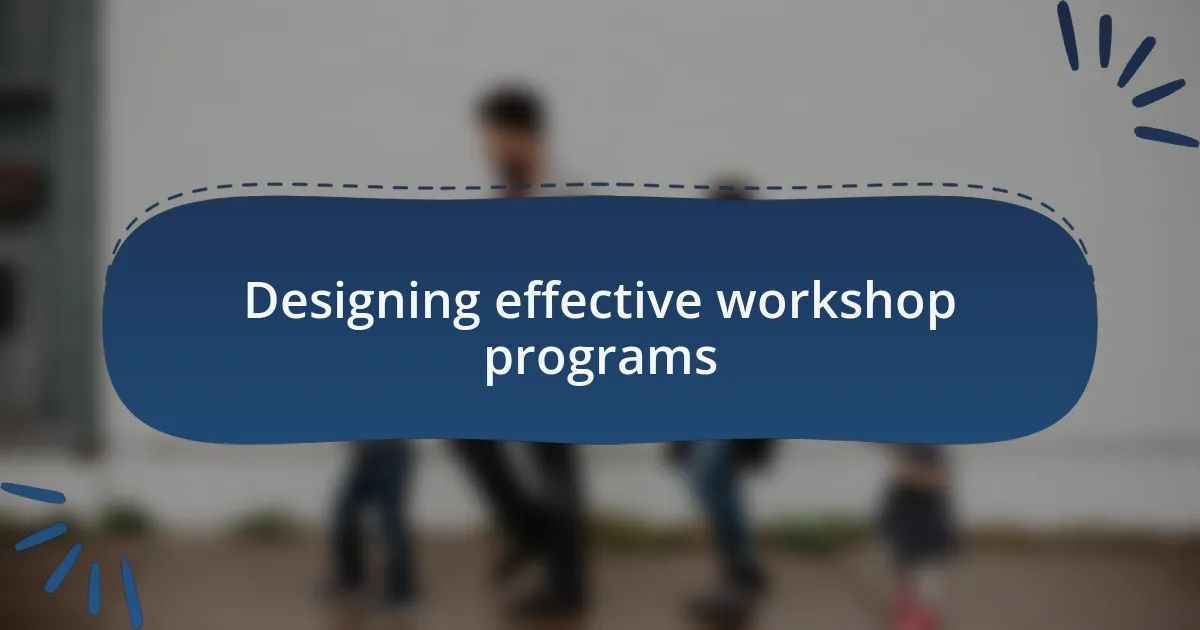
Designing effective workshop programs
Designing effective workshop programs requires a deep understanding of the community’s unique needs and challenges. I recall a workshop I participated in that started with a clear assessment of participants’ interests and concerns. This initial step was vital because it allowed the facilitators to tailor the agenda accordingly, ensuring that every session resonated with the audience. How often do we neglect the importance of starting with the voices of those we aim to help?
Creating an inviting atmosphere can significantly enhance engagement and learning. At one workshop, the organizers set up the room with cozy seating arrangements that encouraged open discussion. I felt more at ease sharing my thoughts, and it became evident that others felt the same way. This experience taught me that the physical environment can greatly influence the willingness of participants to contribute. Does the setting we create speak to the hearts of the attendees?
It’s also essential to incorporate diverse learning methods to reach everyone effectively. I remember a workshop that used role-playing exercises alongside traditional discussions. This approach not only made the topics more relatable but also allowed participants to practice scenarios they might face in real life. Seeing individuals step into these roles brought a sense of empowerment that I hadn’t anticipated. Have you ever witnessed transformation occur when someone feels truly engaged and understood?
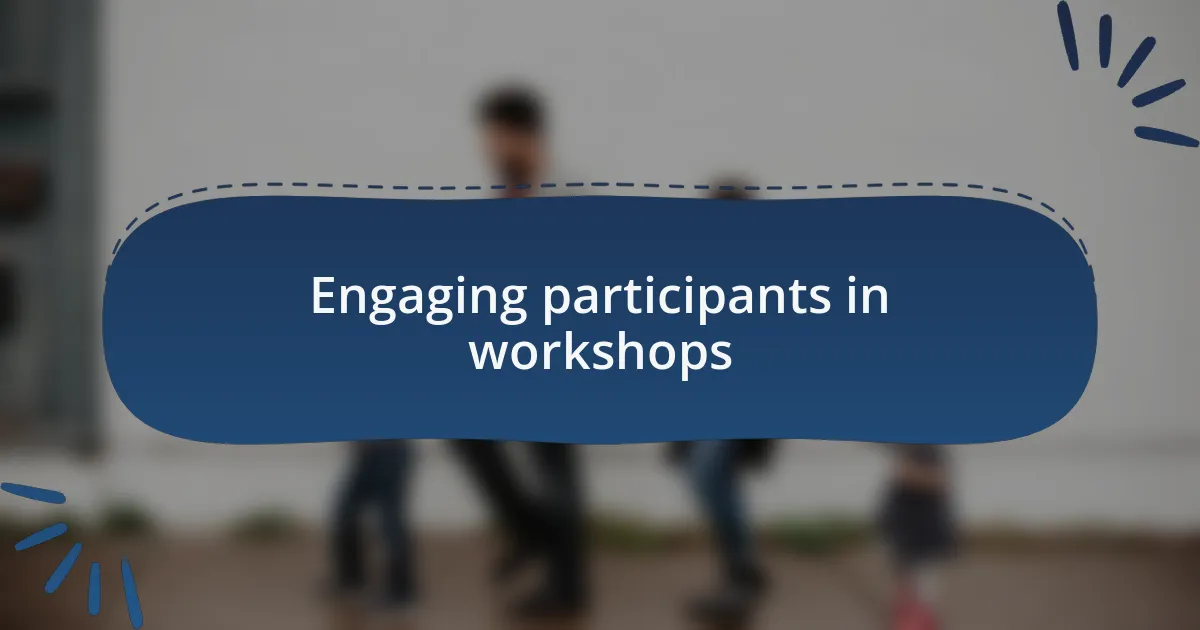
Engaging participants in workshops
Engaging participants in workshops is all about connection. I remember one session that started with an icebreaker where everyone had to share a personal story related to the workshop topic. This simple activity not only broke down barriers but also created an immediate sense of community. Have you ever seen how sharing personal experiences can shift the energy in a room?
Active participation can also be encouraged through hands-on activities. In a recent workshop, we split into small groups and tackled real-life scenarios relevant to our community’s needs. I watched as participants began to brainstorm solutions with enthusiasm, their eyes lighting up with newfound confidence. Isn’t it incredible how the act of working together can ignite creativity and collaboration?
Moreover, feedback loops are critical for sustained engagement. After each session, we were invited to share our thoughts on what worked and what didn’t. I found this practice invaluable, as it not only made me feel heard but also allowed the facilitators to refine their approach for future workshops. Have you considered how important it is to continuously adapt based on participant insights?
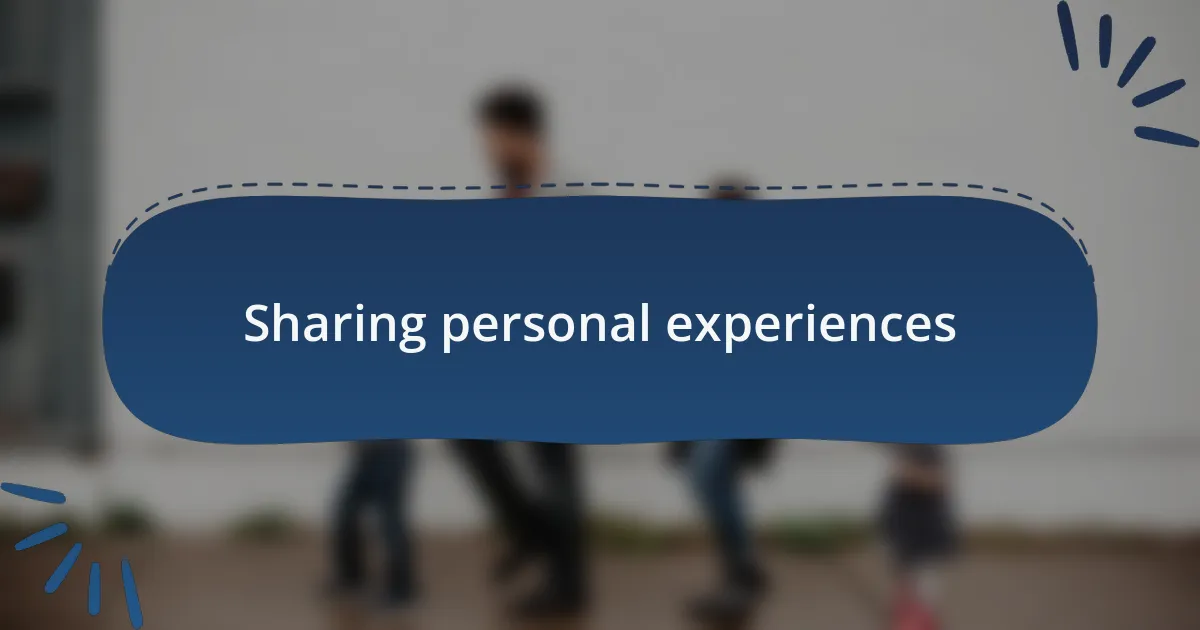
Sharing personal experiences
One of my most memorable experiences in a workshop was when a participant bravely shared her story of overcoming personal hardships related to child safety. Her vulnerability resonated deeply with everyone in the room. It was a reminder of how powerful our narratives can be—do you remember a time when someone’s story inspired you to reflect on your own?
In another workshop, we implemented a storytelling circle where each participant had just two minutes to share a brief personal experience. The atmosphere shifted as people opened up about their challenges and triumphs. It struck me how these snippets of life could create profound connections; it often left me wondering how many untold stories are just waiting to be shared in other community spaces.
Reflecting on these moments, I realize that sharing our experiences fosters empathy and understanding. I once participated in a discussion about child safeguarding, where someone shared their fear of speaking up. Listening to them made me more aware of the barriers others face. Have you ever noticed how sharing our fears can paradoxically make us feel stronger together?